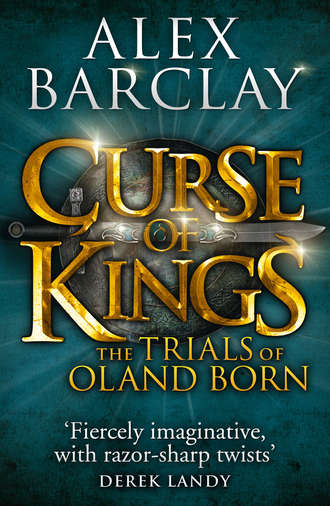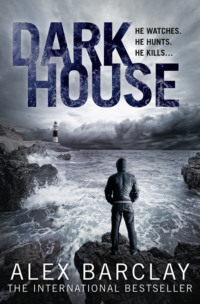
Полная версия
Curse of Kings
“I’ve seen his name!” said Oland, his eyes bright. “In The Sporting Heroes of Envar.” He paused. “Well, in the index. It said ‘athlete, outstanding swimmer, named for all the gold medals he won in championships all over Envar…’”
“To watch Chancey the Gold swim was an extraordinary sight,” said Jerome. “He moved through the water like a spinning ball through the barrel of an arquebus.”
“I wanted to find out more about him,” said Oland, “but, when I turned to the page, the entry was missing.”
Jerome gave a wry smile. “Ripped out by Villius Ren, no doubt… it’s probably the only book he’s ever opened.”
“Why would he do that?” said Oland.
“Twenty years ago,” said Jerome, “Villius Ren visited the Scryer of Gort to have his fortune told, and she told him that his downfall would be at the hands of Chancey the Gold.”
Oland was dubious about the gifts of the scryer. All he knew was that she was imprisoned in a cave in Gort, and warriors and merchants from the surrounding lands would come to her to hear their future failings or fortune in battle or business. She asked each visitor to bring her water and, using a flame above the bowl, she saw visions reflected on its surface.
“Within a year of the scryer’s prophecy,” said Jerome, “Chancey the Gold put his name down for the Mican Games and Villius saw it as the beginning of the prophecy coming to fruition. Villius knew, because of Chancey the Gold’s reputation, that he would be a formidable opponent, and he became fixated on defeating him. It was an unsettling obsession that yielded nothing; when it came to The Games, Chancey made it through the first eight events with little effort. It came to the second-to-last round, Aquatics, and, of course, Chancey won, breaking every record that was ever set. Villius came a distant second, but it still meant that they came face to face in the final round: Acuity. And, of course, in Acuity, Chancey the Gold beat Villius, as any man would.
“Villius was incensed. He believed that an athlete like Chancey the Gold, three years his junior, was no match for the warrior he considered himself to be. I’m guessing that what you did at The Games today reminded him of that defeat. It is more likely that Malachy Graham was meant to die in that arena, but that Villius Ren himself was to slay the beasts, then on to solo glory he would go. Villius Ren does nothing to help anyone else, Oland. Nothing. By doing what you did, I imagine you delivered quite the blow to his plans.”
“What happened to Chancey the Gold?” said Oland.
“He left Decresian in the months before King Micah was overthrown,” said Jerome. “Because of his skill in Aquatics, he was offered a job by the ruler of Dallen.”
“But Decresian and Dallen are bitter enemies,” said Oland.
Jerome nodded. “That is true. But Dallen’s ruler made an exception for Chancey the Gold, because he is the only person who can guide travellers through Dallen Falls – travellers from Decresian who are of benefit to Dallen, or travellers from other parts who would have traditionally reached their destination by sea. They would pay to take a shorter route through Dallen Falls. It was a job that never before existed. As you know, the waterfall is thundering and The Straits below it are wild. The currents move at a terrifying pace. But Chancey the Gold can navigate them. And in Dallen he was safe from Villius Ren.”
“Has Chancey the Gold ever come back to Decresian?” said Oland.
Jerome shook his head. “No,” he said. “There would have to be a very special reason for him to return. The Craven Lodge would surely kill him because of the scryer’s prophecy.”
“Was Chancey the Gold an ally of King Micah?” said Oland.
“We all were,” said Jerome. “And, like Chancey the Gold, I was once champion of The Games – ten years before him. I was given a ten-acre farm by King Micah – for my service, and for my success in The Games. When Villius Ren came to power, he took my land away. He gave all my family jobs, except for me. He knew I would do nothing to harm my family’s prospects; he knew that they could not afford to refuse his offer of employment. And he knew that if I had no job, and lived in a cottage he owned, in a village he terrorised, he had at least some control over me.”
“Why did he want to have control over you?” said Oland.
“He saw me as a threat,” said Jerome. “And you know Villius Ren; he could find a threat in the eyes of an infant.”
Oland smiled.
“So…” said Jerome. “If your aim is the downfall of Villius Ren… and it has always been said that Chancey the Gold was the man to bring it about, well… your next stop should be Dallen Falls.”
Oland suddenly could not imagine being anywhere other than Derrington.
Jerome smiled. He took Oland’s hands in his. “You were chosen, Oland. Do this. Do this for all of us. You have nothing to lose. Chancey the Gold is a good man, and to arrive to him an enemy of Villius Ren is to arrive to him a friend. As you are here.”
Oland stared again into the cold hearth.
Jerome took a breath. “Oland, never forget the reign you have been asked to end: that of Villius Ren, a man among nine hundred and ninety-nine screaming souls, yet with no soul of his own.”
They sat in silence for some time, Oland running King Micah’s words over and over in his head.
But fear not – Decresian shall be restored. And it falls to you, Oland Born, to do so. On such young shoulders, it will prove astonishing how light this burden will be.
To Oland, the burden felt anything but light.
Suddenly, they heard a soft tapping at the parlour window. Jerome went to the back door.
“It’s Villius Ren,” someone hissed. “Alone! Not one of The Lodge is with him.”
Oland stood up.
The Tailor Rynish burst through his workshop door.
“What’s going on?” he growled.
“Villius Ren is in Derrington,” said Jerome.
Oland felt a rough hand grab on to his arm. He turned to see the Tailor Rynish talking over his head to his brother. “I’ll take him,” he was saying.
“What?” said Oland, struggling against him. “Take me where?”
“Shut your mouth!” snarled the tailor. “Shut your mouth; they’ll hear you.” He looked at Jerome. “I’m going to collect The Craven Lodge’s new cloth. Villius knows this so he won’t stand in my way.”
Jerome nodded.
“No,” Oland managed to say. “No.”
“It’s your only hope,” said Jerome.
“I’m not going anywhere!” said Oland. He turned to the tailor. “You work for Villius Ren; I don’t know where you’re going. This could all be a trick—”
“Go, Oland,” said Jerome. “Just go. Unless you want to be in my parlour when Villius Ren bursts in.”
Before Oland had a chance to say another word, the Tailor Rynish was dragging him down the hallway out into the cold night. He pushed him to the back of the cart. As he forced Oland in, a small figure jumped in from the opposite side. Oland could scarcely believe it. It was the monkey, Malben. It gave Oland strange comfort as they were both thrown under a length of tarred canvas.
Oland could hear Jerome’s voice as he leaned down and spoke to him through a gap in the cover: “My brother has a keen eye,” he said. “But do not fear, Oland. For he knows how to turn a blind one.”


Oland could barely breathe. He was wedged between two thick bolts of wool, with another at his feet, and the layer of heavy canvas pressed down on him. He slid the cover from his face at intervals. It offered some relief, but was soon replaced by the chill of icy night air. There was some cloth beneath him, but it did little to cushion him.
Tired of hiding from empty roads, Oland eventually sat up in the corner behind the tailor, with his legs to his chest and Malben curled up, hidden, at his feet. Oland watched from the corner of his eye as the tailor’s shoulders moved up and down, up and down as he worked the reins. Every now and then, he wiped his sleeve under his nose. But still, he drove on. He had not spoken one word to Oland since they left Derrington.
They had been travelling for three hours before Oland felt the horse slow. He slipped back under the cover.
The tailor guided them down a lane with a narrow strip of grass at its centre. The fields on either side were scattered with sheep. The cart came to a stop outside a small white farmhouse. The tailor jumped down and tethered the horse. He pulled back the covers and gestured to Oland to stay quiet and follow him. When he turned away, Oland tucked Malben under the cloth and gave him a look he hoped would make him stay put.
Oland and the tailor made their way around the back of the house to a row of barns. The tailor slid the bolt back on the middle gate and, as they walked in, they were hit with the rich stench of manure. They crossed the filthy floor to the back wall of the barn. The tailor slid a panel of shelves to one side, and pushed open a small door that was hidden behind them. He took off his boots and laid them on a shelf, before he unlatched the door. Oland did the same, and followed the tailor into a cramped, windowless room, lit by a half-melted candle. The floor was strewn with straw, but it had been sprinkled with pine needles, so the air smelled fresher than the barn behind them.
There were two chairs in the room, one bed and a table with a bottle of milk and a sandwich on it. Oland and the tailor sat opposite each other at the table. The tailor took a knife from his pocket and cut the sandwich, handing half to Oland.
“I’m Arthur,” said the tailor. “And I want to say thank you for saving my friend’s life.”
“But I…” Oland paused.
“Malachy knew what he was doing when he agreed to help you,” said Arthur. “But you had no idea what the consequences of your actions would be when you jumped in to help.”
Oland nodded. “No. I didn’t.”
Arthur took a drink from the bottle. “What happened to Malachy tonight was a terrible tragedy,” he said, “but he wasn’t a very healthy man, we all knew that, and he had suffered a terrible shock. Despite what happened in the arena, I know Malachy was proud of the part he played in helping you. Giving you the meat to feed the animals was his quiet protest against The Craven Lodge’s savagery, and his humble way of honouring King Micah. He was very grateful to you for what you did today – he just didn’t get a chance to tell you himself. So I’m telling you now. It’s important for you to know that Malachy Graham’s heart was not your responsibility. It was his. Although, for the most part, he would say that it was his wife who protected it.” He tried to smile.
Oland realised now that Arthur had been crying on the journey.
“Oland,” said Arthur. “There is something different about you. What you did today was extraordinary. Where did you learn to fight like that?”
Oland stared at the floor. “I… don’t know. I didn’t.”
“Where did you come from?” said Arthur.
“I don’t know,” said Oland. He could hear how his own voice cracked.
“I’m sorry,” said Arthur. “I thought perhaps that your parents were from outside Derrington and you were sent to work at the castle.”
“Wickham tells a story,” said Oland. He paused. “Do you know Wickham?”
“I have never met him,” said Arthur, “though I have been given his measurements, have made his clothes, have passed him several times in the castle hallways, yet never seen him in one of my garments.”
“Wickham used to tell a story of a woman who gave birth the night that King Micah was killed,” said Oland, “and that the father of the child was murdered, and that the woman left the baby in a crate with its name pinned to its blanket…”
“And you think that child might be you?” said Arthur.
“I had thought so,” said Oland, “but then I found out that Villius Ren told Wickham all those years ago to make that story up. It sounded like it could be me. It… felt like it could be me. But I don’t know – maybe some of it is true.”
It was the first time he had spoken to anyone about the part he thought he might have had in the story, and he struggled to keep the emotion from his voice. “The mother was to come back to reclaim the boy,” said Oland. “He wasn’t just going to be left there forever.”
“As you say, there may well be some truth in Wickham’s story,” said Arthur. “And, if your parents were at the castle the night King Micah was overthrown, there could be a record of their names. But only if they were there officially, if they were employed there or perhaps visiting. You see that night was also the night of the Decresian census. The king had dispatched his men to call at every house in the kingdom to take a record of the name, age and occupation of every person there at that time, along with details of the land that they owned, the crops that they sowed, and such. That was why there were scant men left to protect King Micah, and why a coward like Villius Ren saw that as his chance to strike.”
“Where is the census now?” said Oland.
Arthur let out a breath. “It could be with the son of Archivist Samuel Ault. There is a bloodline of archivists who originated in Dallen, but who came to Decresian after the ruler of Dallen was overthrown. Samuel Ault’s father was murdered the night of the Dallen uprising.”
“That was the night they stormed King Seward’s Hospital and set it on fire,” said Oland.
Arthur nodded. “The uprising started with the founding of the hospital. King Seward thought he was doing the whole of Envar a great service building a hospital where the plague-stricken could be looked after. The ruler of Dallen at the time welcomed it.”
“But his people didn’t,” said Oland.
“Neither their land nor their livestock had been poisoned, so they wanted nothing to do with the infected patients, even though the plague wasn’t spread from human to human,” said Arthur. “Anyway, the night of the uprising, Samuel Ault’s father had ensured his family’s safe departure to Decresian ahead of him. But, as he was leaving his home, an angry mob descended on him. He was unable to defend himself, and he was beaten and left there to die. His son, Samuel, vowed that his own son, Tristan, would never become an archivist, that he would be trained as a warrior, so that he would always have the skills to survive in what Samuel Ault now came to see as a vicious world. Tristan had no interest in being a warrior – he wanted to follow in his father’s and grandfather’s footsteps, but his father insisted and, from the age of ten, the boy was trained in a special form of combat, Jandro. But, as if the family was condemned to repeat history, Samuel Ault was killed on the night King Micah was overthrown.
“The question is whether Tristan Ault chose to honour his dying father by becoming a warrior or, instead, if he thought that true honour was to be found only by following the Ault family’s ancestral vocation.”


“This is what I know,” said Arthur. “For years, Villius Ren had been King Micah’s closest advisor in practical matters. In matters intellectual, it was Samuel Ault. He was King Micah’s confidant, his scribe, his archivist, the trusted guardian of all the secrets of Decresian. At the time King Micah was overthrown, Tristan Ault was not much older than you are now. I suspect that he was sent away by his father with the history of Decresian – the only thing that could be protected from the treachery of Villius Ren. The last document Samuel Ault would have been working on that night was the census.”
“So, Tristan Ault has the census,” said Oland.
“Perhaps,” said Arthur.
“And where is he now?” said Oland. “Did anyone see him leave the castle?”
“Well,” said Arthur, “there is a story that travelled the length and breadth of Decresian, but no one can trace it to one witness. A boy of his age was seen fleeing the castle the night the king was overthrown. The Craven Lodge had been searing the initials of Villius Ren on to the nape of his neck, as they did to most of us, but this boy struggled, disturbing a lantern and sending oil spilling on to his shoulders. The oil went up in flames against the branding iron and, as The Craven Lodge jumped back from them, this burning boy took the chance to escape. The last he was seen, the flames had died and he was riding off in a carriage filled with chests.”
“Did Tristan Ault abandon King Micah?” said Oland.
“Oh, no,” said Arthur. “There exists an archivist’s oath, a simple two-line oath. It supersedes all other oaths, including that which binds them to their master. Archivists believe that they cannot participate in any event that is to be recorded in the history of the kingdom. They believe that to become a participant would be to curse the future. Their only task is to truthfully chronicle events, and to guard these chronicles fiercely. That is why, if young Tristan Ault decided to take the oath that night and become an official archivist, he would have been compelled to leave the castle.”
“And has Villius Ren ever tried to find him?” said Oland. “I’ve heard no mention of his name in Castle Derrington. And Villius constantly mentions the names of his enemies.”
Arthur shook his head. “To cover the theft of the archives and the census, Villius Ren put the story about many years ago that he slaughtered the entire Ault family.”
“But why, now, would this archivist not come forward?” said Oland.
“As you know,” said Arthur, “archivists lead solitary lives. Samuel Ault would have dealt only with King Micah and Queen Cossima; his father would have dealt only with the ruler of Dallen. Archivists are known for having pride in their work and passion for it, but they seek no public recognition. Their only desire is to faithfully honour the king, the kingdom and its history.”
“But who does Villius Ren say that the burning boy is?” said Oland.
“Oh, you know Villius,” said Arthur. “‘It was a burning rat, a burning weasel…’”
Oland nodded.
“It’s a string of interwoven lies,” said Arthur. “If Villius Ren admits that someone took away the history of Decresian, it would be admitting that King Micah had foreseen Villius’ treachery; otherwise, the documents – of which there were thousands – would never have been packed away in a carriage, ready to be carried away. That would have taken a long time.”
“So, if I could find Tristan Ault, maybe I could find out who my parents are and where I come from,” said Oland.
“I’m afraid that is an onerous ambition,” said Arthur. “Time and again, archivists have witnessed the devastating consequences of misplaced trust, so they trust few.”
“Is there anything else you know about him?” said Oland.
“I have told you everything I know,” said Arthur. He paused. “The only other thing I can think of is that the boy you are looking for, is a man now, close to thirty. And he will bear the scars of a liquid burn on his neck and back.”
As Oland drifted off to sleep, he was occupied by the thought that, along with restoring a kingdom, perhaps he could restore himself, and the cloak of his dark past could be shed. Yet it wasn’t all dark: now that he knew the story of his past was fiction, his father did not have to be a bad man; he was free to imagine an alternative.
He did not have to change his vision of his mother; he had always seen her as brave and strong and loyal. He conjured up a beautiful woman with a kind face, perhaps with his green eyes, perhaps his long fair hair. The comfort of her imagined warmth finally brought him to sleep, and on a makeshift bed in a strange room behind a stinking barn, he had the longest uninterrupted sleep he could remember.
When Oland awoke, he was alone. In the dim candlelight, he saw food on the table. He left it untouched. He went to the small door, and tried to open it. It rattled. It had been latched from the outside. Oland shouted for Arthur. He didn’t care who heard; he didn’t even know who might be there to hear him.
As the hours passed, hunger was turning Oland’s attention to food, but, as the scent of pine needles faded, and the odour of the barn began to seep under the door, he was happy to remain hungry. He lay down on the bed, staring up at the ceiling. He realised he had left his bag in the cart. He patted his pockets. The king’s letter was still there. But he had no book to read, nothing to distract him. At the castle, Oland’s days were filled with dozens of tasks that he had to carry out for The Craven Lodge, after no more than four hours’ sleep. Because he had slept long and peacefully the previous night, he was wide awake. And he was still alone hours later when the candle finally burned out.
A shaft of light eventually appeared at the bottom of the door, and the latch rattled again. Arthur Rynish, with a lantern in his hand, walked in.
“I’m sorry, Oland,” he said. “It took longer than I thought.”
“Where did you go?” said Oland. “Why did you leave me here?”
“There was something not quite right on our journey here,” said Arthur. “It unsettled me. And I needed to make sure that we were safe.”
“You could have left me a note.”
“What you are doing is dangerous, Oland. Were I to have left you a note, and you were discovered, a link would have been made between us. And that cannot happen. For you to carry out this quest, it must be alone.”
“King Micah’s letter said that I was to have a companion,” said Oland.
“I don’t think you should,” said Arthur. “But that’s just my opinion. What I will tell you is that you cannot be connected to my brother or me. You don’t know the Rynishes, you’ve never heard of them – do you understand?”
Oland nodded. “Why?”
“Stop,” said Arthur. “Stop asking questions. I’m telling you things for your own good, for the good of everyone. Say as little as possible, and you will remain in as little danger as possible.”
“Danger?” said Oland. “Why? Do you think anyone else knows where I am going?”
“Just my brother and I,” said Arthur. “And… had you considered… whoever left the letter for you?”
Oland shook his head. “I hadn’t, no.”
“Regardless,” said Arthur, “you are in danger, at the very least for leaving Castle Derrington – for running out on Villius Ren and The Craven Lodge.”
Oland did not say that it had been very clear that Villius Ren wanted him dead.
The following morning, when Oland awoke, Arthur Rynish was sitting in the chair opposite him.
“Your bag,” he said, pointing to the floor. “You left your bag in the cart.”
Oland sat up and pulled the bag towards him. He wondered where the little monkey was. Was he still nearby?
“Eat and let’s go,” said Arthur. “We have many miles to travel before we reach the Dallen border.”









